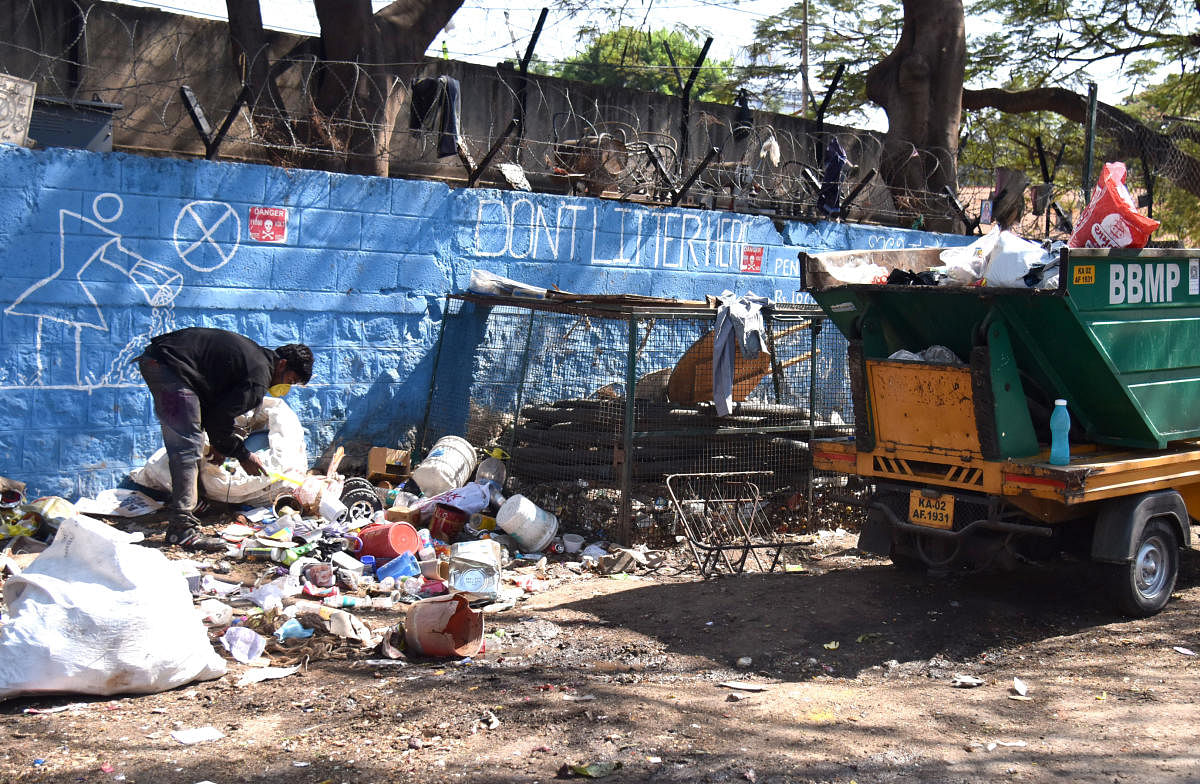Civic workers worry over safety



Among those working through the lockdown are municipal and sanitation workers, and many of them have no protective gear.
Without masks, gloves, and boots, they are exposed to grave risks.
Concerned individuals and groups are urging the BBMP to look into the health and safety concerns of pourakarmikas.
Contractors’ role
D Randeep, special commissioner (solid waste management and health) and zonal commissioner for Mahadevapura, BBMP, says labour contractors are to blame for the lack of protective gear.
“They have to distribute masks and gloves to auto tipper drivers but they have not done it in some places. Drivers and their assistants need to be protected because they directly lift garbage from the black spots. That’s why the BBMP divisional offices in each area has taken up the task of distributing protective gear during this time,” says Randeep.
He says the BBMP has given masks and gloves to those who clean the streets, but concedes more stringent measures should be in place to ensure uniformity and quality of gear.
To ensure municipal workers are not directly involved in the collection of biomedical waste from quarantine centres, the BBMP has directed biomedical waste collectors and professionals to step in.
Rubber, wool gloves
Those working for the welfare of BBMP workers say more needs to be done for workers’ safety.
Lekha Adavi, advocate, says while some pourakarmikas have received rubber gloves, while others got woollen ones.
“Some got locally-made cloth masks, while others have been given surgical masks. None of them have received any boots. The auto drivers, helpers and truck drivers are not given anything,” she says.
She wonders why contractors are not held accountable for the lack of adequate safety measures.
“We are concerned about garbage collection from homes and centres where people are quarantined. We don’t know if they are following proper rules for disposal of waste. Our workers are coming in contact with used and disposed masks,” she says. The masks are thrown randomly and not disposed of with care, she alleges.
The gloves pourakarmikas use are often soaked in garbage, and don’t really serve the purpose of protection, says Lekha.
The BBMP has made no effort to educate municipal workers about Covid-19 symptoms, she told Metrolife.
Food and transport
Nirmala, representative of the BBMP Pourakarmikara Sangha, says the government should provide food and transport for municipal workers during the lockdown.
“They must also take decisions regarding the collection of waste from houses where people are quarantined. We work a full day and sometimes are asked to put in extra hours. The shift system should not be violated,” she says. She says safety gear and food arrangements are grossly inadequate.
Nalini Shekar, co-founder of NGO Hasirudala, manages 33 dry waste collection centres across the city, which bring together 174 municipal staffers working in shifts.
“We have supplied food and safety gear to 3,100 waste collectors who have no ration cards or public housing. We have also made food arrangements for those working round the clock,” Nalini told Metrolife.
There is a limit to which NGOs can help. Thousands in the sanitation sector need urgent support, she says.
Help for manual scavengers
Du Saraswathi, well-known Kannada poet and activist, has formed a group called ‘Tamate’ which is helping manual scavengers during the lockdown.
Saraswathi tells Metrolife, “More than a lakh are still involved in manual scavenging across the State, especially in Bengaluru because the underground drainage systems in many places are incomplete. Their services are still sought after to clean manholes and septic tanks because the existing machinery is insufficient.” She explains that manual scavengers don’t come under any sort of contract system and depend on daily wages to make both ends meet. “They get paid anything between Rs 800 and Rs 1,000, depending on the nature of work. They also live in a
stigmatised environment which doesn’t give them the liberty to mingle with society like others. So, it is imperative to help this category during this crisis period,” urges Saraswathi.
Working with Safai Karmachari Kavalu Samiti, S31DF-India and other organisations, the group has identified 147 manual scavengers in and around Bengaluru and in desperate need of help.
Tamate is sending grocery kits to these families with the help of partner organisations. For details, write to obaleshkb@gmail.com with a copy to info@s3idf.org.
Deccan Herald is on WhatsApp Channels| Join now for Breaking News & Editor's Picks